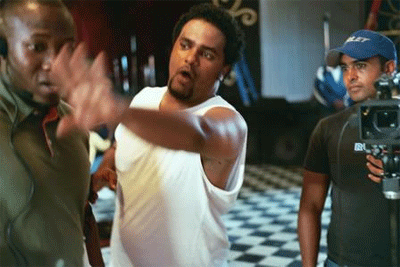Interview with Wondwossen Dikran, director of Journey to Lasta, produced by Reel Image Pictures. Journey to Last was brought to Toronto by AfroSonic Entertainment.
 |
| >> Wondwossen Dikran in action |
I’m sitting in an auditorium at the YMCA, packed with over a hundred young Africans, awaiting the screening of Journey to Lasta. More than just a film about the making of a band; it is a film that reflects their culture and their heritage in a positive and affirming light.
Inspired by a true story, the film chronicles the struggles and triumphs of the real Lasta Sound band. Tsegaye, a wise, outspoken singer; Teferi, a shy, unassuming drummer; and Kirubel, a romantic, diplomatic bass player, all dream of being a world-class band despite their lack of funds and their current mundane existence. They play their roles with such realism, drawing on their experiences.
“They are actually musicians, which is an incredible feat because they weren’t trained actors or anything,” says Wondwossen Dikran, director of Journey to Lasta. Dressed in a white African shirt and gray slacks, he smiles broadly, thinking back to the production. “They were so natural at what they were doing that they brought a lot of heart and a lot of positive energy into the project. So when you surround them with people that either come from theatre or film, it‘s a great blend, excellent chemistry.”
It was the unique sound of the band that captured Dikran’s interest and inspired the making of the film. “Their sound is a blend of so many genres of music and it was very conscious music too. It had jazz, fusion, a little bit of funk, little bit of reggae, African-Carribean music, and calypso. But the more time I spent with the guys, the more I realized we had a unique story that we were going to be able to tell.”
Based in LA, the film follows the three men as they struggle with romantic relationships, a scheming publicity manager, and the desperation of thinking their big break will never come. The messages in this film are universal.
“I think the central theme of the film, is really the quest of achieving your dreams, what you set out to do. And believe me, it’s not a one plus one makes two kind of a narrative. You go through a lot of different layers of emotions, the highs and the lows,” says Dikran thoughtfully.
“You’ve been given a certain gift, whether you’re an athlete, a musician, a poet, a painter, or a scientist. There are a lot of things you can be. But it's so important to wake up every day and realize that and to have a purpose of contributing not only to yourself but to those surrounding you.”
Born in Addis Ababa in Ethiopia before immigrating to LA, Dikran is very aware of having positive images of oneself reflected on the big screen.
“I made a trip to Ethiopia after seven years to take this film back, and the one thing I made sure I would do was not necessarily hang around within the urban city but to really take the time to go out to different parts of the country and find out exactly where I came from and what my language is all about, what my identity is all about, my sub-being. Once I think you have a very coherent understanding of that, it is when you become stronger.”
The film has been screened in L.A., Seattle, Washington, Maryland, Dallas, and Minnesota and is continuing to tour the U.S. and several film festivals. Despite the difficulty of getting films distributed by major studios, Dikran is optimistic about independent filmmaking.
“If you want to make a film, get up and make a film. I don’t care how you do it; there’s always a way to do it. You are put in corners where you are going to have to solve your problems—not necessarily money, but being able to be creative with your shots.”
He offers this advice to aspiring filmmakers: “You have to understand your strengths and your weaknesses and take advantage of opportunities that open up to you. Be resourceful, and use your money wisely. You are going to have to want it to a point where you will do anything to make it happen. At the end of the day, that’s all that is required.”

